
Korea-U.S. Free Trade Agreement: Analysis of Public Opinion Surveys on Ratification
Future of Trade, Technology, Energy Order | Commentary·Issue Briefing | 2011-10-24
Wonchil Chung
EAI Issue Briefing on Public Opinion
There was a lot at stake for the Korean Congress in August 2011, and one of them was the Korea-U.S. Free Trade Agreement (KORUS FTA). Regarding this bill, the two main parties have been pitted against one another. The Grand National Party (GNP) asserts that the FTA bill has at least to be submitted to the Standing Committee; while the Democratic Party (DP) suggests the 10+2 renegotiation proposal (see Appendix 1) for the KORUS FTA that impose restrictions on the arrangement. If the DP's proposal is agreed upon by the National Congress, ratification becomes impossible, since the proposal will allow the negotiation of the FTA, in progress for more than four years (2006 to February 2011), to be taken back to square one. It is true that the KORUS FTA has a lot to offer when it comes to economic aspects, as the Ministry of Strategy and Finance (MOSF) pointed out in its analysis (see Appendix 2). With that in mind, the GNP risks its political position, as public opinion displays distrust and dissatisfaction over the imbalance between Korea and the United States shown during the progress of the negotiation (see Appendix 3).
Results of the July 2011 survey
Figure 1 shows the public opinion percentages for when ratification should occur or if opposed to ratification. It relates the time of ratification both to the August date and after renegotiation, as well as in relation to ratification by the U.S. Congress.
Figure 1. Opinion on the KORUS FTA and Its Point of Ratification
|
Opinion on August Ratification of KORUS FTA
|
Opinion on the Timing of the Ratification (among those in favor thereof)
|
In examining Figure 1, only 25.8 percent of the respondents were positive about ratification in August; while those in favor of ratification after further negotiations were 20.5 percentage points higher, at 40.3 percent. Those entirely against the ratification itself represented a clear minority on the issue (9.4 percent). It is notable that 18.4 percent of the respondents did not answer at all or answered that they were unsure, a clear indicator that the public did not receive sufficient information about the issue.
Among the respondents who weren't negatively positioned against the ratification itself, 41.5 percent responded that the ratification should occur at the same time as the U.S. Congress vote on it; 21.5 percent were in favor of waiting until after that vote; and 26.2 percent said Korea should vote before the U.S. Congress. Those unsure when the right time for a vote would be were 20.8 percent. Judging from that, 63 percent were in favor of Korean ratification on or after the U.S. Congress.
Although some of the respondents answered that the KORUS FTA should be ratified during the August session, this did not imply that the bill had to be ratified before the U.S. Congress ratifies it.
Figure 2 compares those who favor August ratification and those who favor ratification after renegotiation in relation to action by the U.S. Congress.
Figure 2. Preference Between August Ratification and Ratification After Renegotiation Relative to Action by the U.S. Congress
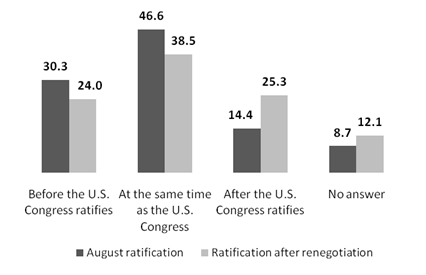
In reference to Figure 2, of those who supported the August ratification, 30.3 percent agreed that the bill should be ratified in Korea before the U.S. ratification. Among the respondents in favor of ratification by National Congress, 46.4 percent answered that it should be at about the same time as the U.S. Congress passed the bill, and 14.4 percent said it should be after that. In other words, even if respondents agreed to ratify the bill in August, 61 percent of them still thought it should be ratified about the same time as or after the U.S. Congress. The answers tended to be similar to those who answered that it should be ratified after further renegotiations. In this case, 24.0 percent answered that it should be passed before the decision by the U.S. Congress, and 38.5 percent said it should happen at the same time, thus with 63.8 percent agreeing that ratification should be about the same time as or after the U.S. Congress. Only 25.3 percent favored ratification after ratification by the U.S. Congress.
The current situation seems to imply that the GNP does not have sufficient public support for its position on the KORUS FTA; and the people of Korea do not agree that the KORUS FTA should be ratified in the month of August. Instead, the public wants the discussion and negotiations about the FTA to be conducted in a prudent and well-informed manner. The general opinion seems to be that there is no need to rush toward a ratification of the KORUS FTA.
Figure 3 demonstrates that the public favors exercising prudence regardless of their political views. Widely used political variables such as ideological tendency, level of support for the current administration, partisanship, and support of the presidential candidate were considered in the analysis.
Figure 3. Political Background related to Opinion on KORUS FTA Ratification
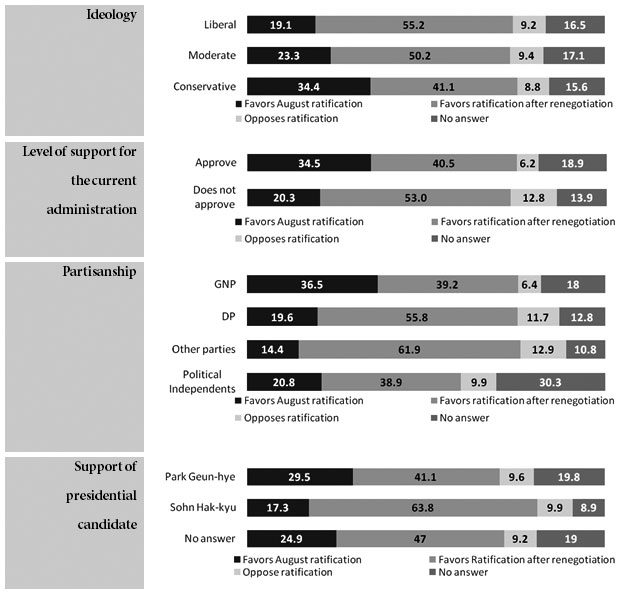
There were no significant differences in any of the political variables in terms of the patterns of the public’s opinions. Among supporters of the Liberal Party, 19.1 percent approved August ratification, significantly lower than the 34.4 percent among supporters of the GNP, Nevertheless, 41.1 percent of the conservative spectrum supported a renegotiation of the bill, and the overall opinion among all supporters of the GNP was not in favor of August ratification. The results were the same if the groups were divided by the level of support for the current administration and the presidential candidates.
As illustrated in Figure 4, public opinion does not vary much for the factors of age, education, income, or the use of social networking systems (SNS).
Figure 4. Demographic Background and Opinion on KORUS FTA Ratification
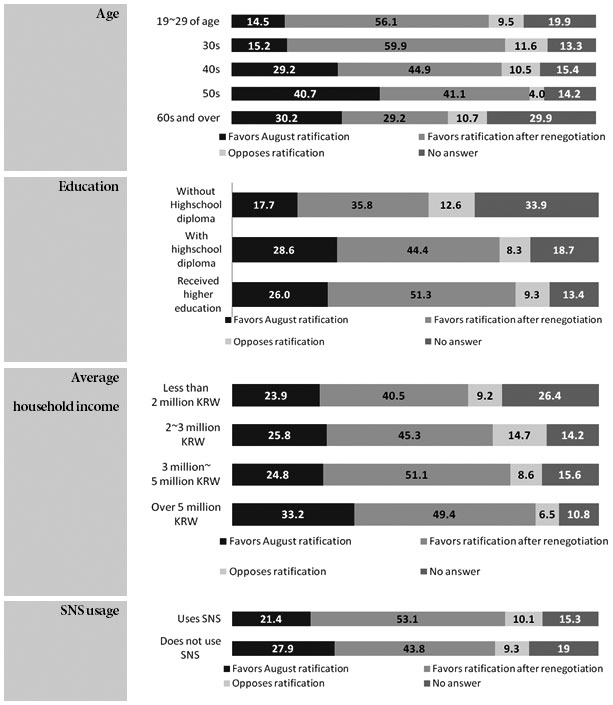
The negative view on the ratification of the KORUS FTA during the August term did not vary based on the individuals' political, social, or demographic background. The analysis compared the rate of approval on ratifying the FTA according to the age, education, income and the use of SNS. Results showed that people in their 50s were most supportive of the August ratification, with 40.6 percent in favor of passing the bill then. Those in their 60s came in second, with a 30.2 percent support rate. Among all other age groups less than 20 percent favored ratification in August. The majority of those under 50 believed that the bill should be ratified after renegotiation. Even for those in the 50s and 60s categories, it was almost even whether it should be ratified in August or after renegotiation. Thus, most groups, regardless of whether they were divided by education, income, or use of SNS, favored ratification after renegotiation instead of August ratification.
Figure 5 relates the public’s preference for ratification relative to timing based on what administration is in power in the Korean government.
Figure 5. May 2011 Survey Result on the Preferred Timing of the KORUS FTA ratification in Korean Congress (among those in favor of an early ratification)
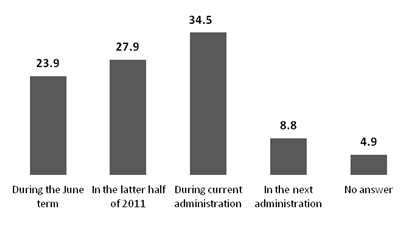
This demonstrates that 23.9 percent support the KORUS FTA ratification during the August congressional term; 34.5 percent support it during the remainder of the Lee administration; and 8.8 percent vote to postpone the issue until the next administration takes office.
Changes in Public Opinion from Earlier Surveys
There have been changes in public opinion since the October 2010 and February 2011 surveys compared to the May 2011 survey that indicate the public wants a more prudent approach. The reasons for the public's demand for prudence lies in the so far insufficient investigation into the use of defoliants by the U.S. military on the Korean peninsula, and the delay of the ratification of the KORUS FTA in the U.S. Congress. In the May survey, which was carried out after the discovery of the use of defoliants, opinions demanding a fast ratification in the Korean Congress decreased. The numbers fell from 63.8 percent in October 2010 and 65.8 percent in February 2011 to 57.8 percent in May 2011. The change in the public's opinion can be seen even more clearly in the replies concerning the timing of ratification. As shown in Figure 5, the May survey showed 23.9 percent in support of ratification during the June term; 27.9 percent favored the latter half of 2011; 34.5 percent favored for ratification within this administration's legislative period; and 8.8 percent for postponing it until the next administration would take office.
Figure 6 demonstrates that there was little change in the public attitude toward favoring the agreement between 2006 and 2008, although the percentages were different with a greater number favoring it in 2008.
Figure 6. Public Opinion on KORUS FTA in 2006 and 2008
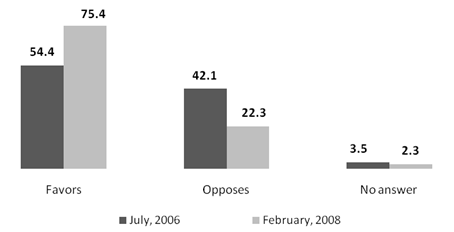
Negative responses against early ratification seemed unrelated to the general opinion about the ratification itself. In the surveys conducted in July 2006 and February 2008, the majority supported the KORUS FTA. The recent survey displayed similar results, with only 9.4 percent replying that they were against ratification. The 2006 survey took place right after the second round of FTA negotiations in Seoul. At that time, 54.4 percent were supportive of the FTA, while 42.1 percent were against it. In 2008, when the initial agreement was signed in Washington, the public discussion calmed down, and those welcoming the FTA outnumbered those against it by a ratio of 3:1 at an approval rate of 75.4 percent.
The surveys of 2006 and 2008 and the recent survey all show a consistent inclination toward support of the KORUS FTA. This comparison also implies that the social consensus on KORUS FTA can be traced back to 2006, when the negotiation was underway.
Table 1 reflects that the social background of the respondents did not seem to have any effect on their opinion about the FTA. Every aspect that respondents agreed on in the 2006 survey gained further support in the 2008 survey.
Table 1. Public Opinion on KORUS FTA in 2006 and 2008 Depending on Age, Income and Political Views
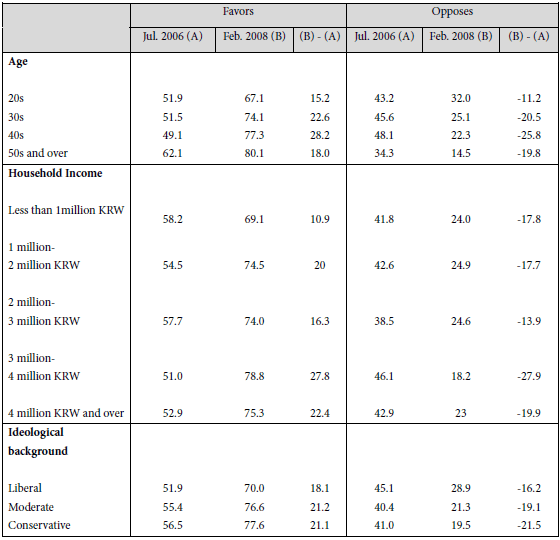
The positive reaction towards KORUS FTA continued throughout 2006 and 2008 and even after 2010. The four public opinion surveys conducted in 2010 and 2011 regarding the KORUS FTA display how the general public in Korea thinks of the Free Trade Agreement and are shown in Figure 7 and 8.
|
Figure 7. Opinion on KORUS FTA
|
Figure 8. Opinion on Ratification of KORUS FTA in Korean Congress |
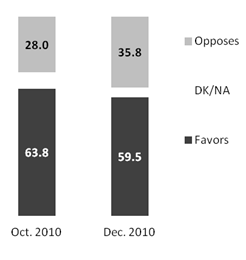 |
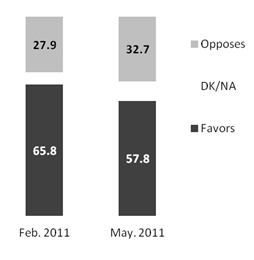 |
In the two surveys conducted in 2010, the questionnaires were dealing with the negotiations about the KORUS FTA, while the February and May 2011 surveys focused on the opinion on the timing of the ratification. In all of the four surveys, a clear majority favored the FTA. Those against it peaked at 35.8 percent in December 2010 and continued to stay between 20 to 30 percent.
It seems clear that the public sentiment of Koreans is in favor of the FTA. The hesitancy toward a swift ratification of the KORUS FTA seems to stem from the feeling of imbalance between Korea and the United States regarding the benefits that the FTA will generate for each country, and from what is perceived as the government moving too quickly toward ratification. In order to ratify the KORUS FTA in August, it would be necessary to improve the general public's understanding of the issues, including awareness of the contents of the agreement, rather than putting too much effort into further debates among the political parties.
Center for Public Opinion Research
Center for Trade, Technology, and Transformation
Future of Trade, Technology, Energy Order
![[ADRN Issue Briefing] Decoding India’s 2024 National Elections](/data/bbs/eng_issuebriefing/20240419123938102197065(1).jpg)
Commentary·Issue Briefing
[ADRN Issue Briefing] Decoding India’s 2024 National Elections
Niranjan Sahoo | 2011-10-24
![[ADRN Issue Briefing] Inside the Summit for Democracy: What’s Next?](/data/bbs/eng_issuebriefing/2024032815145548472837(1).jpg)
Commentary·Issue Briefing
[ADRN Issue Briefing] Inside the Summit for Democracy: What’s Next?
Ken Godfrey | 2011-10-24